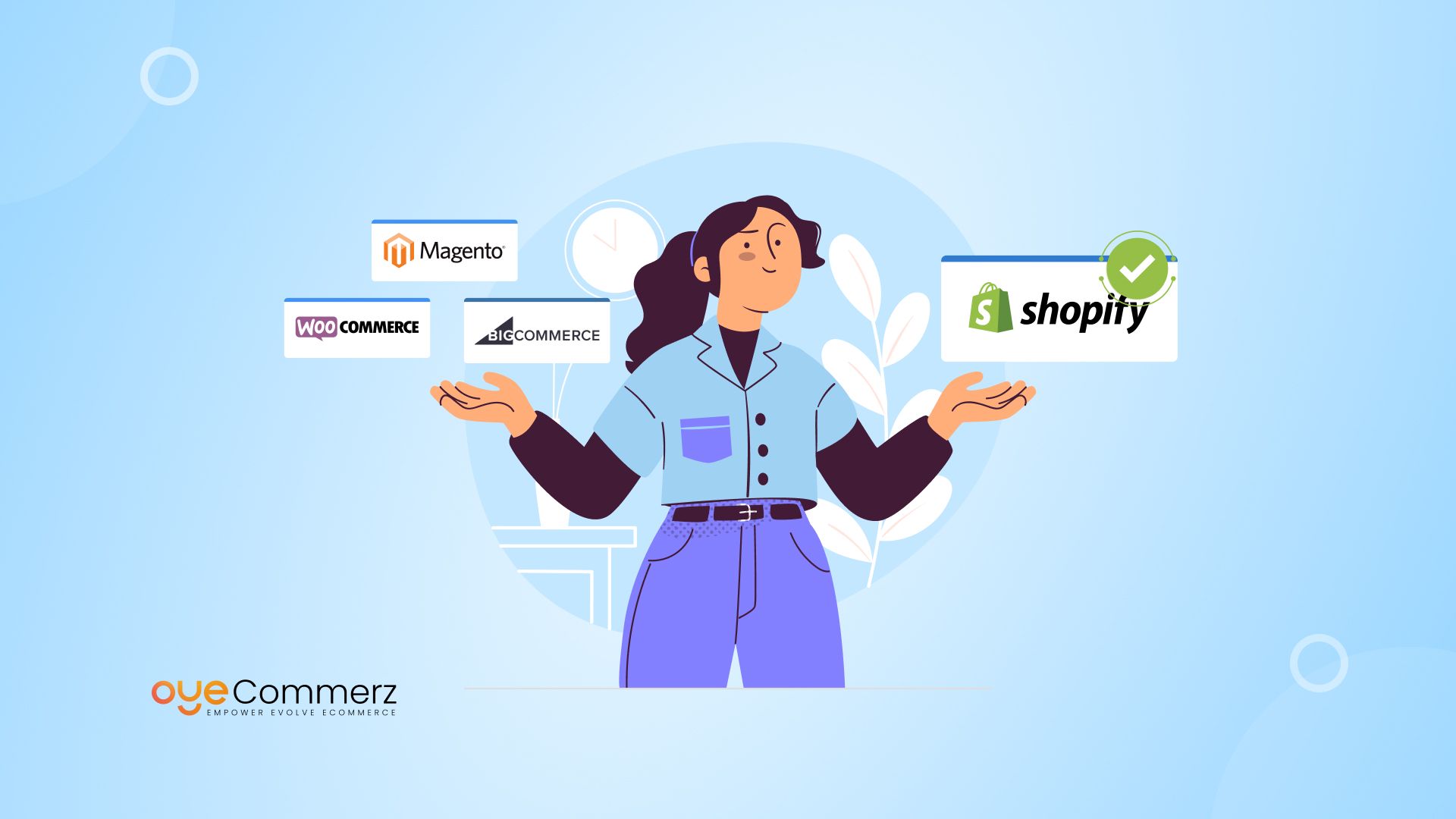Is your eCommerce platform holding back your growth? You’re not alone—over 68% of enterprise brands are moving away from WooCommerce, Magento, and BigCommerce in favor of Shopify. As an existing Shopify business owner, you already know the power of a seamless, scalable online store. But why are so many brands making the switch? This data-driven analysis breaks down the key reasons why brands are choosing Shopify over other platforms, from lower maintenance costs to faster innovation. Let’s dive in!
Table of Contents
ToggleThe Growing Shift Toward Shopify: A Market Overview
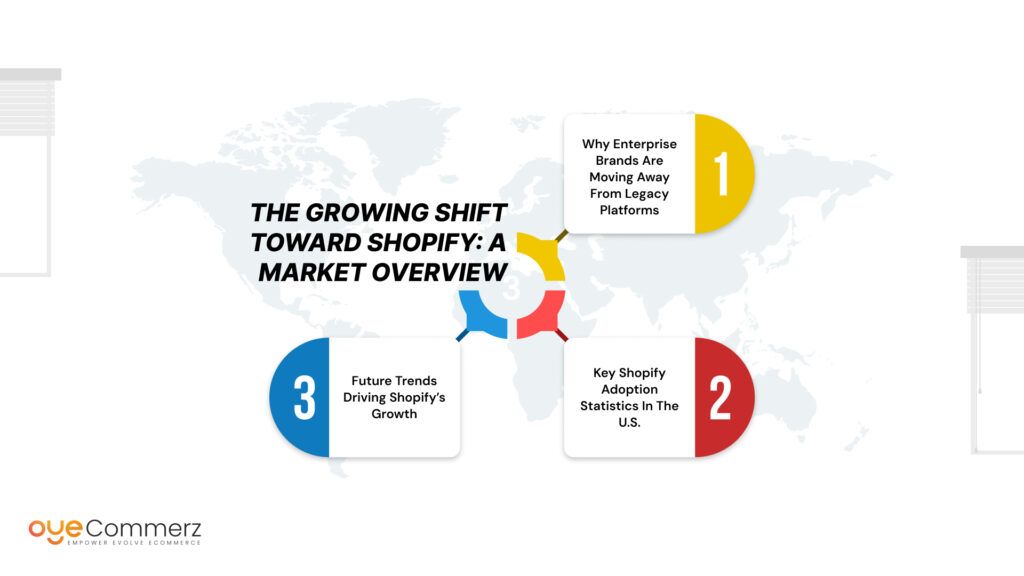
In recent years, an increasing number of enterprise brands choosing Shopify over other platforms like WooCommerce, Magento, and BigCommerce. This shift is driven by Shopify’s ability to provide a scalable, secure, and cost-effective solution tailored for high-growth businesses.
Why Enterprise Brands Are Moving Away from Legacy Platforms
Traditional e-commerce platforms often come with complex maintenance requirements, high development costs, and limited scalability. Here’s why major brands are making the switch:
- Rising Maintenance Costs – WooCommerce and Magento require ongoing development, security patches, and hosting fees that add up over time. Shopify offers a hassle-free, fully managed cloud-based solution.
- Performance & Speed – Shopify’s optimized infrastructure ensures faster load times, reducing bounce rates and improving conversions.
- Mobile & Omnichannel Readiness – With mobile commerce growing rapidly in the U.S., Shopify provides seamless mobile-first experiences, along with omnichannel selling through social media and marketplaces.
- Security & Compliance – Shopify is PCI DSS Level 1 compliant by default, while platforms like WooCommerce and Magento require manual security configurations.
Key Shopify Adoption Statistics in the U.S.
- Over 4.5 million merchants worldwide trust Shopify.
- Shopify Plus powers some of the biggest enterprise brands, including Allbirds, Gymshark, and Kylie Cosmetics.
- Shopify merchants saw a 76% year-over-year increase in online sales, outperforming other platforms.
Future Trends Driving Shopify’s Growth
- Headless Commerce Adoption – Shopify enables brands to build flexible, fast storefronts without backend limitations.
- AI-Powered Personalization – Shopify’s advanced AI tools help brands create tailored shopping experiences.
- Subscription & B2B Capabilities – More enterprises are leveraging Shopify for scalable subscription models and B2B commerce.
With enterprise retailers prioritizing performance, scalability, and cost-efficiency, it’s clear why brands choosing Shopify over other platforms to future-proof their e-commerce operations.
Understanding the Core Differences: Shopify vs. WooCommerce, Magento & BigCommerce
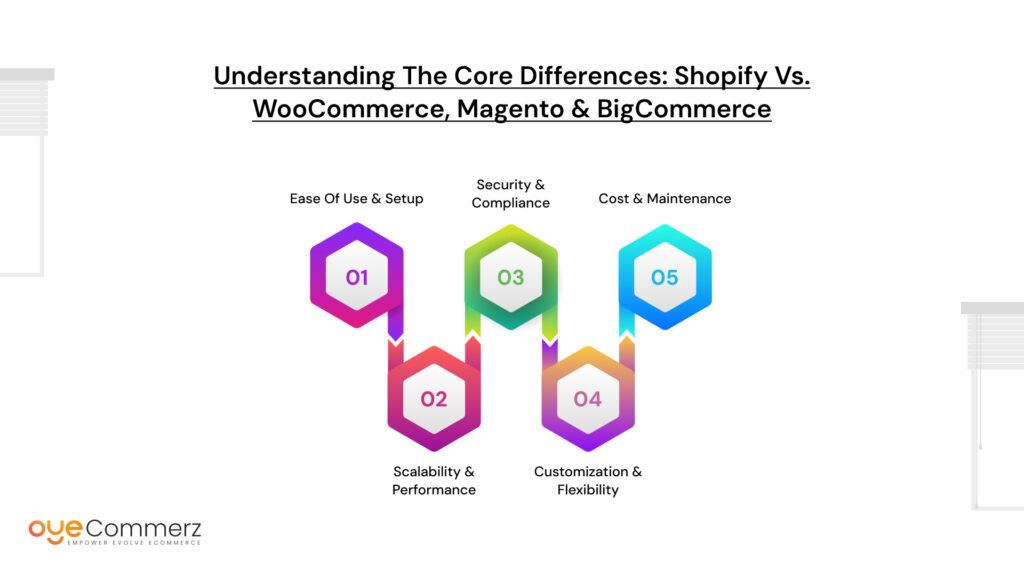
As enterprise e-commerce evolves, businesses must choose platforms that support long-term scalability, performance, and cost efficiency. Today, brands choosing Shopify over other platforms like WooCommerce, Magento, and BigCommerce due to its ease of use, lower maintenance costs, and powerful built-in features. Let’s explore the key differences that make Shopify the preferred choice.
1. Ease of Use & Setup
- Shopify: Fully hosted, user-friendly platform with an intuitive interface that requires no coding knowledge. Enterprise teams can launch and scale operations quickly.
- WooCommerce: Requires self-hosted WordPress installation, manual plugin management, and frequent updates.
- Magento: Highly complex, requiring dedicated developers and extensive customization to set up and maintain.
- BigCommerce: Offers an easier setup than Magento but lacks the flexibility and vast app ecosystem of Shopify.
✅ Winner: Shopify – Ideal for businesses that need a seamless, scalable solution with minimal technical effort.
2. Scalability & Performance
- Shopify: Cloud-based infrastructure ensures 99.99% uptime, lightning-fast load speeds, and built-in scalability for high-traffic brands.
- WooCommerce: Performance depends on hosting provider; frequent scaling challenges arise as traffic grows.
- Magento: Scalable but requires dedicated server management and costly optimizations for high-volume traffic.
- BigCommerce: Good scalability but may face API limitations in high-growth scenarios.
✅ Winner: Shopify – Provides enterprise-grade performance without the need for costly infrastructure management.
3. Security & Compliance
- Shopify: PCI DSS Level 1 compliant by default, offering automatic updates, SSL encryption, and fraud protection.
- WooCommerce: Requires manual security measures such as firewalls, SSL certificates, and third-party security plugins.
- Magento: Offers strong security but requires in-depth developer oversight and frequent updates.
- BigCommerce: Provides good security features but may need additional measures for enterprise compliance.
✅ Winner: Shopify – Provides built-in, hassle-free security, reducing compliance risks for enterprises.
4. Customization & Flexibility
- Shopify: Extensive app marketplace, API integrations, and Shopify Plus capabilities for custom storefronts.
- WooCommerce: Highly customizable due to WordPress flexibility but requires manual plugin integration.
- Magento: Best for extreme customization, but development and maintenance are costly.
- BigCommerce: Customization options exist but are more limited compared to Shopify’s ecosystem.
✅ Winner: Shopify – Offers the perfect balance of flexibility, ease of integration, and low development costs.
5. Cost & Maintenance
- Shopify: Transparent pricing with no hidden costs. Shopify Plus is cost-effective for enterprises compared to Magento’s custom licensing fees.
- WooCommerce: Low initial cost but high ongoing expenses for hosting, plugins, and security updates.
- Magento: Requires significant investment in development, hosting, and maintenance.
- BigCommerce: Monthly pricing model similar to Shopify but lacks the extensive app ecosystem.
✅ Winner: Shopify – Delivers the best long-term value with lower maintenance and predictable costs.
For businesses looking to migrate to Shopify and unlock the full potential of enterprise e-commerce, That’s why Brands Choosing Shopify Over Other Platform
Technical Capabilities: How Shopify Stands Out for Enterprises
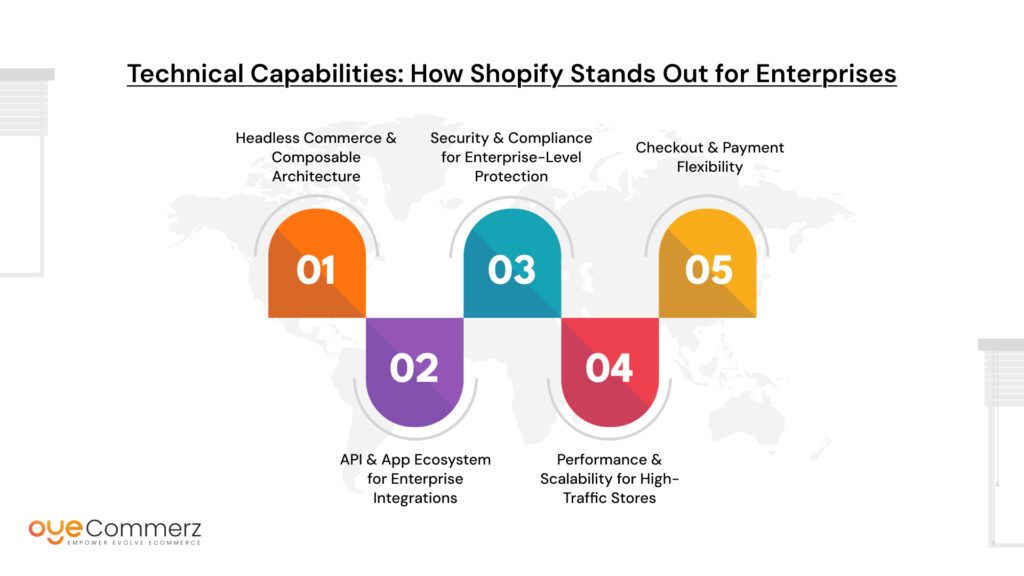
As enterprise e-commerce brands scale, technical capabilities become a critical factor in platform selection. More brands choosing Shopify over other platforms like WooCommerce, Magento, and BigCommerce due to its robust infrastructure, advanced integrations, and seamless user experience. Let’s explore Shopify’s key technical advantages.
1. Headless Commerce & Composable Architecture
- Shopify: Supports headless commerce, allowing enterprises to decouple the front-end from the backend for a faster, more customizable storefront experience. Brands can integrate Shopify’s backend with frameworks like React, Vue.js, or Next.js for a seamless headless solution.
- WooCommerce: Requires extensive development effort and third-party plugins to achieve headless capabilities.
- Magento: Offers headless commerce but requires a dedicated team to implement and maintain it.
- BigCommerce: Provides some headless capabilities but lacks the extensive app marketplace Shopify offers.
✅ Winner: Shopify – A future-proof headless commerce solution with lower development overhead.
2. API & App Ecosystem for Enterprise Integrations
- Shopify: Offers a robust API ecosystem, allowing seamless integration with ERP, CRM, inventory management, and marketing automation tools. Shopify Plus users get exclusive API enhancements for faster and more scalable connections.
- WooCommerce: Relies on third-party plugins for integrations, often leading to compatibility issues.
- Magento: Offers deep customization through APIs but requires extensive development and maintenance.
- BigCommerce: Provides API support but has rate limits that may impact high-volume brands.
✅ Winner: Shopify – A vast app ecosystem and powerful API support make Shopify the most adaptable platform for enterprise integrations.
3. Security & Compliance for Enterprise-Level Protection
- Shopify: PCI DSS Level 1 certified by default, ensuring payment security without additional configuration. Shopify also offers automatic SSL encryption, fraud detection, and advanced data protection.
- WooCommerce: Requires manual security configurations, including third-party SSL certificates and firewalls.
- Magento: Security patches must be manually applied, and enterprise-grade security often requires custom development.
- BigCommerce: Provides built-in security but may require additional customization for industry-specific compliance needs.
✅ Winner: Shopify – Built-in, enterprise-grade security without extra maintenance.
4. Performance & Scalability for High-Traffic Stores
- Shopify: A fully hosted SaaS platform with 99.99% uptime, auto-scaling servers, and optimized global CDN for fast load speeds.
- WooCommerce: Performance depends on hosting provider; requires caching and optimization to handle high traffic.
- Magento: Can be scalable, but requires dedicated server infrastructure and tuning to optimize performance.
- BigCommerce: Good uptime but lacks Shopify’s seamless multi-server scaling capabilities.
✅ Winner: Shopify – Delivers superior speed and performance with automatic scalability.
5. Checkout & Payment Flexibility
- Shopify: Offers a fast, optimized checkout process with Shopify Payments, supporting multiple payment methods, one-click checkout, and Buy Now, Pay Later (BNPL) solutions.
- WooCommerce: Checkout depends on third-party payment gateways and plugins, increasing complexity.
- Magento: Highly customizable but requires development effort for an optimized checkout experience.
- BigCommerce: Provides native payment integrations but lacks Shopify’s extensive payment options.
✅ Winner: Shopify – Optimized checkout process leading to higher conversions.
For enterprise brands seeking a technically advanced, low-maintenance, and future-proof e-commerce solution,it’s the main reason Brands Choosing Shopify Over Other Platform
Performance Metrics & User Experience: Data-Driven Comparison
For enterprise brands, e-commerce success depends on fast load speeds, seamless navigation, and a frictionless checkout experience. That’s why brands choosing Shopify over other platforms like WooCommerce, Magento, and BigCommerce. Shopify’s optimized infrastructure enhances performance, boosts conversions, and improves user experience. Let’s break it down with data-driven insights.
1. Website Load Speed & Performance Benchmarks
A slow website can cost businesses thousands in lost revenue. Studies show that a 1-second delay in page load time can reduce conversions by 7%. Here’s how Shopify compares:
- Shopify: Uses a built-in global Content Delivery Network (CDN), automatic image optimization, and server-side caching for sub-2 second load times.
- WooCommerce: Performance is hosting-dependent; requires caching, a CDN, and manual optimizations.
- Magento: Needs dedicated server tuning and caching (like Varnish) to maintain speed, especially for large catalogs.
- BigCommerce: Offers a CDN but lacks Shopify’s automatic performance optimizations.
✅ Winner: Shopify – Consistently delivers faster page speeds with minimal effort.
2. Mobile Responsiveness & Conversion Rates
With over 60% of U.S. e-commerce traffic coming from mobile devices, mobile optimization is critical.
- Shopify: Mobile-first design with responsive themes, AMP support, and an optimized checkout experience.
- WooCommerce: Mobile performance depends on theme and plugin selection; requires manual optimization.
- Magento: Supports mobile responsiveness but needs additional development for seamless performance.
- BigCommerce: Provides mobile-friendly themes but lacks built-in AMP support like Shopify.
✅ Winner: Shopify – Mobile-ready for high-speed, frictionless shopping experiences.
3. Checkout Efficiency & Abandoned Cart Recovery
A complicated checkout process can increase cart abandonment rates by up to 70%. Here’s how platforms compare:
- Shopify: Offers Shopify Payments, one-click checkout, and Buy Now, Pay Later (BNPL) solutions like Affirm and Klarna.
- WooCommerce: Checkout process varies by payment gateway; requires plugins for optimization.
- Magento: Customizable checkout but requires developer intervention for efficiency.
- BigCommerce: Provides built-in abandoned cart recovery but lacks Shopify’s native express checkout solutions.
✅ Winner: Shopify – Reduces friction with faster, high-converting checkout options.
4. Customer Experience & Personalization
E-commerce success isn’t just about speed—it’s about delivering a personalized, seamless shopping experience.
- Shopify: AI-powered product recommendations, dynamic pricing, and personalized email marketing automation.
- WooCommerce: Requires third-party plugins like OptinMonster and Mailchimp for personalization.
- Magento: Supports deep customization, but high development costs make advanced personalization expensive.
- BigCommerce: Limited built-in personalization tools compared to Shopify’s AI-driven features.
✅ Winner: Shopify – Enables AI-powered personalization without additional development costs.
5. SEO & Organic Traffic Performance
SEO is crucial for driving organic traffic, and a platform’s technical SEO capabilities can make or break search visibility.
- Shopify: Built-in SEO-friendly URL structures, auto-generated sitemaps, schema markup, and fast loading times (a key ranking factor).
- WooCommerce: Requires Yoast SEO or other plugins to optimize SEO settings.
- Magento: SEO-friendly but needs custom development to fully optimize.
- BigCommerce: Provides decent SEO tools but lacks Shopify’s seamless optimizations.
✅ Winner: Shopify – SEO-ready out of the box for better rankings and visibility.
Why Enterprise Brands Are Choosing Shopify Over Other Platforms
Performance and user experience directly impact revenue. Shopify provides enterprise brands with:
✅ Lightning-fast load speeds for higher conversions
✅ Mobile-first design & AMP support
✅ AI-powered personalization & optimized checkout
✅ Built-in SEO tools for better search rankings
For Brands Choosing Shopify Over Other Platform prioritize speed, seamless shopping experiences, and revenue growth, Shopify consistently outperforms WooCommerce, Magento, and BigCommerce.
Enterprise-Level Customization & Integrations
For enterprise businesses, flexibility and integration capabilities are crucial for scaling operations. This is why brands choosing Shopify over other platforms like WooCommerce, Magento, and BigCommerce. Shopify offers a powerful ecosystem that allows businesses to customize their online stores without the technical complexity of other platforms. Let’s explore how Shopify outperforms its competitors in customization and third-party integrations.
1. Customization Flexibility: Shopify vs. Competitors
Enterprise brands need a platform that allows deep customization without compromising performance or requiring extensive development.
- Shopify: Offers a balance of easy-to-use, customizable themes and advanced development capabilities with Shopify’s Liquid templating language. Brands can modify storefronts without affecting backend stability.
- WooCommerce: Provides full customization but requires manual coding and plugin dependencies, making it difficult to manage at scale.
- Magento: Highly customizable but requires extensive developer resources, making it time-consuming and expensive.
- BigCommerce: Allows customization but lacks the flexibility and developer support ecosystem of Shopify.
✅ Winner: Shopify – Provides the best mix of customization and ease of use for enterprise brands.
2. API & Third-Party Integrations
Seamless integration with third-party tools is critical for enterprise operations. Shopify offers a robust API infrastructure that supports various enterprise-level applications.
- Shopify: Shopify Plus provides exclusive API access for ERP, CRM, and inventory management integrations, ensuring businesses can scale without system limitations.
- WooCommerce: API is available, but integrating enterprise tools often requires custom coding and middleware solutions.
- Magento: Offers advanced API support, but integrations require dedicated development teams for maintenance.
- BigCommerce: Decent API capabilities but has rate limits that can restrict high-volume businesses.
✅ Winner: Shopify – Enterprise-grade APIs enable effortless integration with existing systems.
3. Omnichannel Selling & Marketplace Integrations
Enterprise brands require seamless omnichannel capabilities to maximize sales across multiple touchpoints.
- Shopify: Provides native integrations with Facebook, Instagram, Amazon, eBay, Walmart, and TikTok, allowing businesses to sell across multiple channels without third-party solutions.
- WooCommerce: Requires separate plugins for each marketplace, leading to higher maintenance costs.
- Magento: Supports omnichannel selling, but requires custom development to integrate multiple channels.
- BigCommerce: Offers built-in omnichannel support but lacks the deep integrations Shopify provides.
✅ Winner: Shopify – The easiest and most powerful omnichannel selling platform.
Contact to Migrate your Site to Shopify Now
SEO & Marketing Capabilities for Enterprise Growth
For enterprise brands, driving traffic and increasing conversions are top priorities. That’s why brands choosing Shopify over other platforms like WooCommerce, Magento, and BigCommerce. Shopify provides built-in SEO, marketing automation, and omnichannel advertising tools that help businesses scale without relying on excessive third-party solutions. Let’s explore how Shopify outperforms competitors in SEO and marketing capabilities.
1. Built-In SEO Optimization for Higher Search Rankings
Search engine visibility is crucial for enterprise brands, and Shopify provides out-of-the-box SEO-friendly features that give businesses an edge over competitors.
- Shopify:
✅ Auto-generated sitemaps for Google indexing
✅ Clean URL structures (no excessive parameters)
✅ Fast load speeds (a major ranking factor)
✅ Built-in schema markup for rich snippets (product reviews, prices, etc.) - WooCommerce: Requires Yoast SEO or other plugins for proper optimization; relies on hosting speed.
- Magento: Supports advanced SEO customization but requires developer assistance to optimize site speed and technical SEO.
- BigCommerce: Offers some built-in SEO tools but lacks Shopify’s optimized URL structure and easy customization.
✅ Winner: Shopify – Best for technical SEO with minimal effort.
2. Content Marketing & Blogging Capabilities
A well-optimized blog helps drive organic traffic and build brand authority.
- Shopify: Comes with a built-in blogging platform that integrates seamlessly with the storefront. Shopify’s SEO-friendly editor helps optimize content for search rankings.
- WooCommerce: Has WordPress’s advanced blogging features, making it a great content marketing tool but requiring SEO plugins for full optimization.
- Magento: Lacks a built-in blog, requiring third-party extensions for content marketing.
- BigCommerce: Offers blogging functionality but limited SEO customization compared to Shopify and WooCommerce.
✅ Winner: Shopify – A balance between ease of use and SEO-friendly blogging.
3. AI-Powered Marketing Automation & Email Campaigns
Enterprise brands need automated marketing tools to engage customers and boost sales.
- Shopify:
✅ Shopify Email – built-in email marketing automation
✅ Shopify Flow – AI-driven marketing automation for abandoned cart recovery, customer segmentation, and personalized campaigns
✅ Built-in discounts & promotions for scalable marketing strategies - WooCommerce: Requires Mailchimp, HubSpot, or third-party plugins for automation.
- Magento: Offers marketing automation but requires extensive customization.
- BigCommerce: Has some automation features but lacks Shopify’s AI-driven tools.
✅ Winner: Shopify – Built-in automation simplifies marketing for enterprise brands.
Cost & Maintenance: The Long-Term Investment Perspective
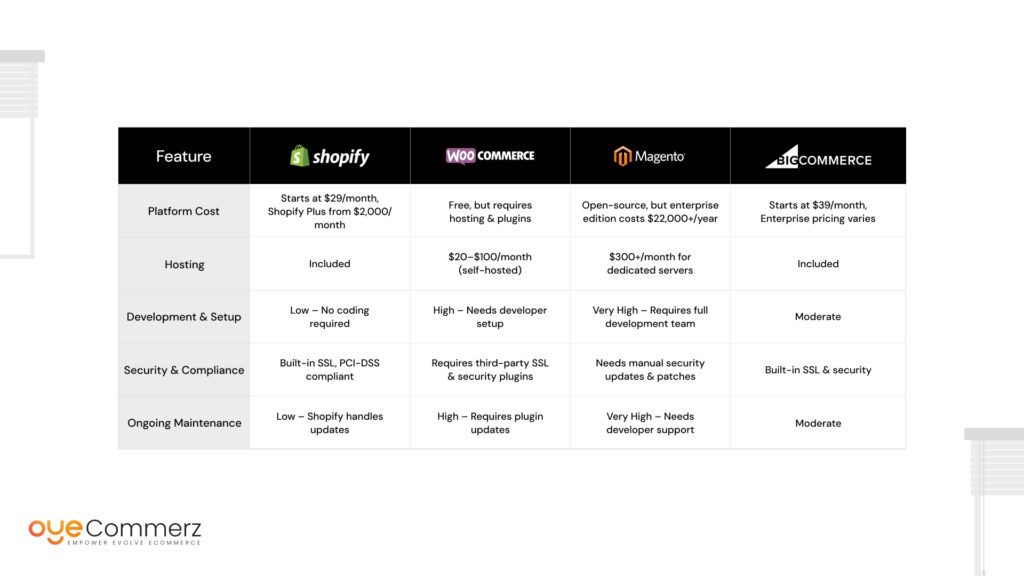
For enterprise brands, choosing the right e-commerce platform isn’t just about features—it’s about long-term cost efficiency and ease of maintenance. This is why brands choosing Shopify over other platforms like WooCommerce, Magento, and BigCommerce. Shopify offers predictable pricing, lower maintenance costs, and fewer hidden expenses, making it the ideal choice for enterprise-level scalability. Let’s break down the cost comparison.
2. Hidden Costs in WooCommerce, Magento & BigCommerce
Many enterprise brands initially choose WooCommerce or Magento thinking they are cost-effective, only to discover hidden expenses like:
- WooCommerce: Requires separate payments for hosting, security, premium themes, and essential plugins (e.g., SEO, payment gateways).
- Magento: Open-source version is free, but enterprise businesses spend $30,000–$100,000+ annually on development, hosting, and maintenance.
- BigCommerce: Charges additional transaction fees for high-volume stores, increasing costs over time.
✅ Winner: Shopify – Transparent pricing with no hidden costs.
3. Maintenance & Support Costs
Enterprise businesses need a low-maintenance, high-reliability solution to focus on growth rather than technical challenges.
- Shopify: Shopify manages hosting, security, and platform updates—requiring minimal IT intervention.
- WooCommerce: Frequent manual updates for WordPress, themes, and plugins, leading to high maintenance costs.
- Magento: Requires dedicated developers for bug fixes, security patches, and performance optimizations.
- BigCommerce: Handles maintenance, but custom development can be costly.
✅ Winner: Shopify – Minimal maintenance with 24/7 enterprise support.
Conclusion
The e-commerce landscape is evolving, and enterprise brands need a scalable, high-performance, and cost-efficient solution to stay ahead. That’s why brands choosing Shopify over other platforms like WooCommerce, Magento, and BigCommerce.
From seamless scalability and enterprise-grade security to powerful built-in SEO, marketing automation, and omnichannel selling, Shopify offers everything a growing business needs—without the technical headaches and hidden costs of other platforms.
Key Takeaways:
Effortless scalability with Shopify Plus for high-growth brands
Best-in-class security & compliance with PCI-DSS Level 1 certification
Optimized performance for faster load times and higher conversions
Seamless omnichannel selling across social media, marketplaces, and POS
Lower total cost of ownership (TCO) with predictable pricing and minimal maintenance
Powerful AI-driven marketing & automation to boost sales and retention
Make the Move to Shopify with OyeCommerz
Migrating to a new platform can feel overwhelming, but it doesn’t have to be. At OyeCommerz, we specialize in hassle-free Shopify migrations for enterprise brands. Whether you’re switching from WooCommerce, Magento, or BigCommerce, we ensure a seamless transition with zero downtime and full data integrity.
Frequently Asked Questions
Shopify Plus offers cloud-based infrastructure with unlimited bandwidth and high uptime, eliminating the need for self-hosting or server management—something that can become a bottleneck in WooCommerce or Magento setups.
Key features include Shopify Magic (AI content creation), personalized email campaigns via Shopify Email, automated upsells/cross-sells, AI chatbots, and integration with top-tier AI analytics and CRM platforms.
Yes, recent data shows Shopify stores have faster average page load times and higher Lighthouse scores than Magento or WooCommerce stores, especially under traffic surges common during enterprise-scale campaigns.
Shopify’s curated app marketplace and robust API access allow enterprise brands to plug in high-quality third-party tools quickly—reducing customization time and improving go-to-market speed, a common pain point in WooCommerce and Magento.
Shopify Plus includes dedicated account managers, 24/7 priority support, and launch engineers—resources that are often either missing or require additional investment on platforms like WooCommerce and BigCommerce.

